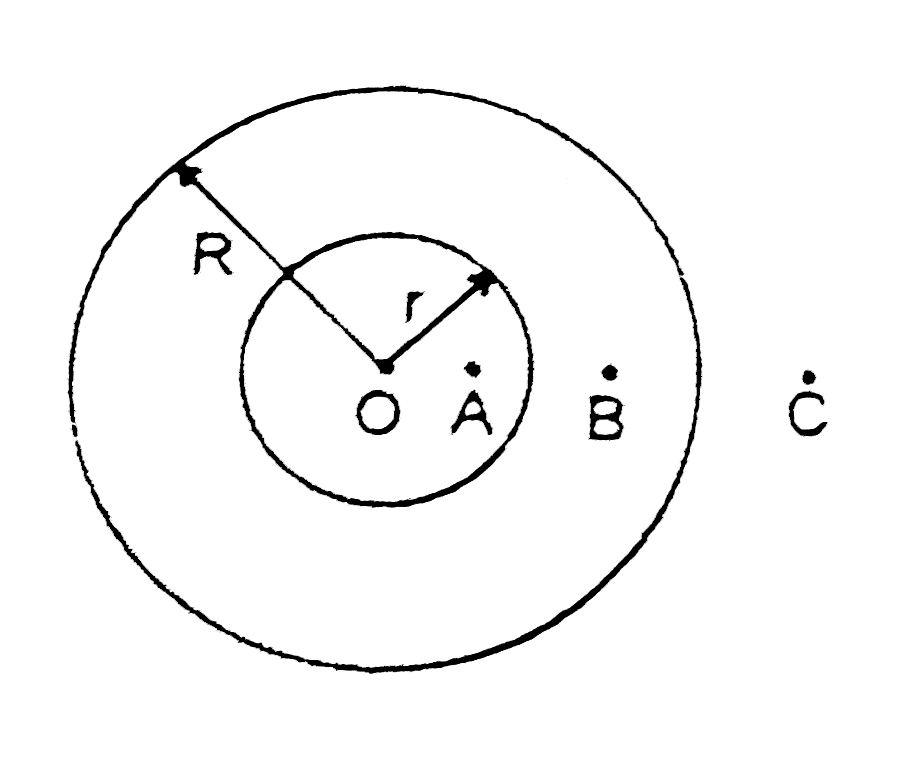A non-conducting solid sphere has volume charge density that varies as ρ=ρ0 r, where ρ0 is a constant and r is distance from centre. Find out electric field intensities at following positions.
(i) r<R (ii) r≥R
To find the electric field intensity at different positions in a non-conducting solid sphere with a volume charge density that varies as ρ=ρ0r, we will use Gauss's Law. Let's solve the problem step by step.
Step 1: Understanding the Charge Density
The charge density is given as:
ρ(r)=ρ0r
where ρ0 is a constant and r is the distance from the center of the sphere.
Step 2: Case (i) r<R
For points inside the sphere (i.e., r<R), we will apply Gauss's Law. The electric field E is radial due to symmetry.
Step 2.1: Choose a Gaussian Surface
We choose a Gaussian surface that is a sphere of radius r (where r<R).
Step 2.2: Apply Gauss's Law
Gauss's Law states:
∮E⋅dA=Qencϵ0
The left side becomes:
E⋅4πr2
where E is constant on the Gaussian surface.
Step 2.3: Calculate the Enclosed Charge Qenc
To find Qenc, we integrate the charge density over the volume of the sphere of radius r:
Qenc=∫r0ρ(r′)dV=∫r0ρ0r′⋅4πr′2dr′
=4πρ0∫r0r′3dr′=4πρ0(r′44)r0=πρ0r4
Step 2.4: Substitute Back into Gauss's Law
Now substituting Qenc back into Gauss's Law:
E⋅4πr2=πρ0r4ϵ0
Solving for E:
E=ρ0r24ϵ0
Step 3: Case (ii) r≥R
For points outside the sphere (i.e., r≥R), we again apply Gauss's Law.
Step 3.1: Choose a Gaussian Surface
We choose a Gaussian surface that is a sphere of radius r (where r≥R).
Step 3.2: Calculate the Total Charge Qtotal
The total charge Qtotal in the sphere of radius R is:
Qtotal=∫R0ρ(r′)dV=∫R0ρ0r′⋅4πr′2dr′
=4πρ0∫R0r′3dr′=4πρ0(r′44)R0=πρ0R4
Step 3.3: Apply Gauss's Law
Using Gauss's Law:
E⋅4πr2=Qtotalϵ0=πρ0R4ϵ0
Solving for E:
E=ρ0R44ϵ0r2
Final Results
1. For r<R:
E=ρ0r24ϵ0
2. For r≥R:
E=ρ0R44ϵ0r2
The charge density is given as:
ρ(r)=ρ0r
where ρ0 is a constant and r is the distance from the center of the sphere.
For points inside the sphere (i.e., r<R), we will apply Gauss's Law. The electric field E is radial due to symmetry.
We choose a Gaussian surface that is a sphere of radius r (where r<R).
Gauss's Law states:
∮E⋅dA=Qencϵ0
The left side becomes:
E⋅4πr2
where E is constant on the Gaussian surface.
To find Qenc, we integrate the charge density over the volume of the sphere of radius r:
Qenc=∫r0ρ(r′)dV=∫r0ρ0r′⋅4πr′2dr′
=4πρ0∫r0r′3dr′=4πρ0(r′44)r0=πρ0r4
Now substituting Qenc back into Gauss's Law:
E⋅4πr2=πρ0r4ϵ0
Solving for E:
E=ρ0r24ϵ0
For points outside the sphere (i.e., r≥R), we again apply Gauss's Law.
We choose a Gaussian surface that is a sphere of radius r (where r≥R).
The total charge Qtotal in the sphere of radius R is:
Qtotal=∫R0ρ(r′)dV=∫R0ρ0r′⋅4πr′2dr′
=4πρ0∫R0r′3dr′=4πρ0(r′44)R0=πρ0R4
Using Gauss's Law:
E⋅4πr2=Qtotalϵ0=πρ0R4ϵ0
Solving for E:
E=ρ0R44ϵ0r2
1. For r<R:
E=ρ0r24ϵ0
2. For r≥R:
E=ρ0R44ϵ0r2
Topper's Solved these Questions
- ELECTROSTATICSBook:RESONANCEChapter:ELECTROSTATICSExercise:Problems
Explore 22 Videos
- ELECTROSTATICSBook:RESONANCEChapter:ELECTROSTATICSExercise:Exercise-1 Section (A)
Explore 9 Videos
- ELECTROMAGNETIC INDUCTIONBook:RESONANCEChapter:ELECTROMAGNETIC INDUCTIONExercise:A.l.P
Explore 19 Videos
- EXPERIMENTAL PHYSICSBook:RESONANCEChapter:EXPERIMENTAL PHYSICSExercise:PART -II
Explore 10 Videos
Similar Questions
A solid sphere of radius R has a mass distributed in its volume of mass density ρ=ρ0 r, where ρ0 is constant and r is distance from centre. Then moment of inertia about its diameter is
View SolutionA solid non conducting sphere of radius R has a non-uniform charge distribution of volume charge density, ρ=ρ0rR, where ρ0 is a constant and r is the distance from the centre of the sphere. Show that : (i) the total charge on the sphere is Q=πρ0R3 (ii) the electric field inside the sphere has a magnitude given by, E=KQr2R4
View Solution
Knowledge Check
A solid sphere of radius R has a volume charge density ρ=ρ0r2 (where ρ0 is a constant ans r is the distance from centre). At a distance x from its centre (for x<R), the electric field is directly proportional to :
A1/x2B1/xCx3Dx2There is one long non-conducting solid cylinder of radius R. The volume charge density is given by ρ=kx2 where k is a constant and x is the distance of the point from centre of cylinder. Electric field intensity inside the cylinder at a distance x from the centre is
Akx23ε0Bkx34ε0Ckx32ε0Dkx3ε0A non-conducting solid sphere of radius R is uniformly charged. The magnitude of the electric filed due to the sphere at a distance r from its centre
AIncreases as r increases inside the sphereBDecreases as r increases inside as well as outsideCIncreases as increases outside the sphereDIs discontinuousat r=R
A Uniformly charged solid non-conducting sphere of uniform volume charge density ρ and radius R is having a concentric spherical cavity of radius r. Find out electric field intensity at following points, as shown in the figure :

(i) Point A (ii) Point B
(iii) Point C (iv) Centre of the sphere
View SolutionA solid non conducting sphere of radius R and uniform volume charge density ρ has its centre at origin. Find out electric field intensity in vector form at following positions :
(i) (R/2,0,0) (ii) (R√2,R√2,0) (iii) (R,R,0)
View SolutionA solid sphere of radius R is charged with volume charge density p=Krn , where K and n are constants and r is the distance from its centre. If electric field inside the sphere at distance r is proportional to r4 ,then find the value of n.
View SolutionThe volume charge density inside of sphere of radius R is given by ρ=ρ0(1−rR) ,where ρ0 is constant and r distance from centre.
(a) Find total charge Q inside sphere.
Electric field outside sphere at distance r from centre.
(b) Electric field outside sphere at distance r from centre.
(c) Electric field inside sphere at distance r from centre.
(d) At what distance from centre electric field is maximum and its value?
(e ) Sketch E versus r graph.
View SolutionA solid sphere of radius R has a charge Q distributed in its volume with a charge density ρ=kra, where k and a are constants and r is the distance from its centre. If the electric field at r=R2 is 18 times that r=R, find the value of a.
View Solution